Tomb-sweeping Day 清明节英语简介
- 格式:pptx
- 大小:1.89 MB
- 文档页数:11
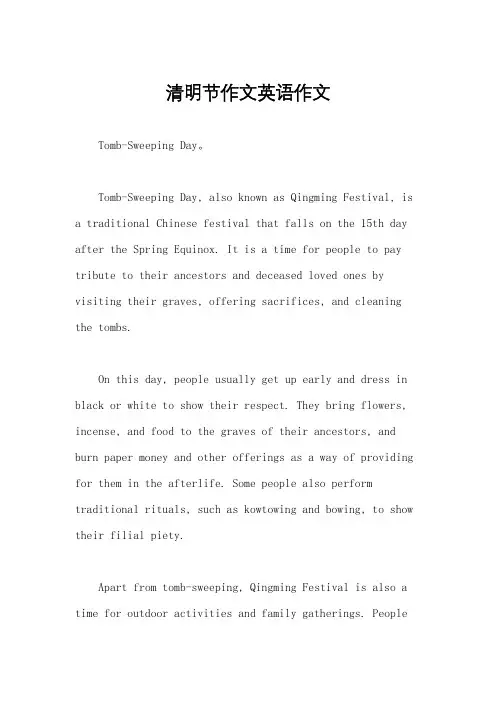
清明节作文英语作文Tomb-Sweeping Day。
Tomb-Sweeping Day, also known as Qingming Festival, is a traditional Chinese festival that falls on the 15th day after the Spring Equinox. It is a time for people to pay tribute to their ancestors and deceased loved ones by visiting their graves, offering sacrifices, and cleaning the tombs.On this day, people usually get up early and dress in black or white to show their respect. They bring flowers, incense, and food to the graves of their ancestors, and burn paper money and other offerings as a way of providing for them in the afterlife. Some people also perform traditional rituals, such as kowtowing and bowing, to show their filial piety.Apart from tomb-sweeping, Qingming Festival is also a time for outdoor activities and family gatherings. Peopleoften go on outings, fly kites, and enjoy the spring scenery. They also eat traditional foods, such as qingtuan (green rice balls) and crispy cakes, which are associated with the festival.However, with the rapid development of modern society, the traditional way of tomb-sweeping is gradually changing. Many people now choose to pay tribute to their ancestors online or through other modern means, instead of visiting their graves in person. This reflects the changing values and lifestyles of contemporary Chinese society.In conclusion, Tomb-Sweeping Day is an important tradition that reflects the Chinese people's respect for their ancestors and their cultural heritage. It is a time for family reunions, outdoor activities, and spiritual reflection. While the way of celebrating the festival may change over time, its significance and meaning will always remain the same.。
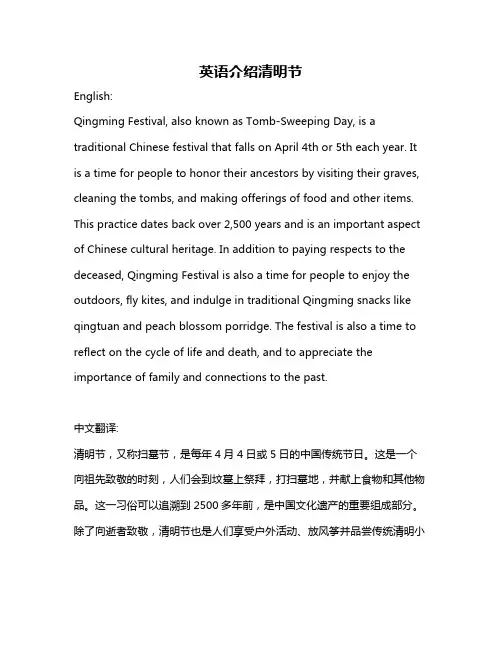
英语介绍清明节English:Qingming Festival, also known as Tomb-Sweeping Day, is a traditional Chinese festival that falls on April 4th or 5th each year. It is a time for people to honor their ancestors by visiting their graves, cleaning the tombs, and making offerings of food and other items. This practice dates back over 2,500 years and is an important aspect of Chinese cultural heritage. In addition to paying respects to the deceased, Qingming Festival is also a time for people to enjoy the outdoors, fly kites, and indulge in traditional Qingming snacks like qingtuan and peach blossom porridge. The festival is also a time to reflect on the cycle of life and death, and to appreciate the importance of family and connections to the past.中文翻译:清明节,又称扫墓节,是每年4月4日或5日的中国传统节日。
这是一个向祖先致敬的时刻,人们会到坟墓上祭拜,打扫墓地,并献上食物和其他物品。
这一习俗可以追溯到2500多年前,是中国文化遗产的重要组成部分。
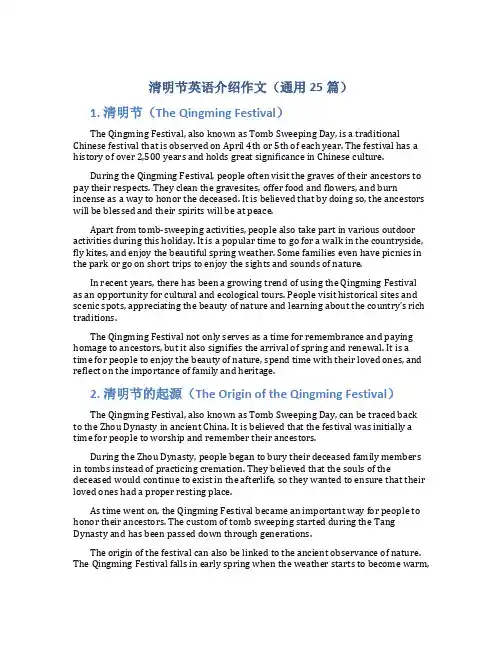
清明节英语介绍作文(通用25篇)1. 清明节(The Qingming Festival)The Qingming Festival, also known as Tomb Sweeping Day, is a traditional Chinese festival that is observed on April 4th or 5th of each year. The festival has a history of over 2,500 years and holds great significance in Chinese culture.During the Qingming Festival, people often visit the graves of their ancestors to pay their respects. They clean the gravesites, offer food and flowers, and burn incense as a way to honor the deceased. It is believed that by doing so, the ancestors will be blessed and their spirits will be at peace.Apart from tomb-sweeping activities, people also take part in various outdoor activities during this holiday. It is a popular time to go for a walk in the countryside, fly kites, and enjoy the beautiful spring weather. Some families even have picnics in the park or go on short trips to enjoy the sights and sounds of nature.In recent years, there has been a growing trend of using the Qingming Festival as an opportunity for cultural and ecological tours. People visit historical sites and scenic spots, appreciating the beauty of nature and learning about the country’s rich traditions.The Qingming Festival not only serves as a time for remembrance and paying homage to ancestors, but it also signifies the arrival of spring and renewal. It is a time for people to enjoy the beauty of nature, spend time with their loved ones, and reflect on the importance of family and heritage.2. 清明节的起源(The Origin of the Qingming Festival)The Qingming Festival, also known as Tomb Sweeping Day, can be traced backto the Zhou Dynasty in ancient China. It is believed that the festival was initially a time for people to worship and remember their ancestors.During the Zhou Dynasty, people began to bury their deceased family members in tombs instead of practicing cremation. They believed that the souls of the deceased would continue to exist in the afterlife, so they wanted to ensure that their loved ones had a proper resting place.As time went on, the Qingming Festival became an important way for people to honor their ancestors. The custom of tomb sweeping started during the Tang Dynasty and has been passed down through generations.The origin of the festival can also be linked to the ancient observance of nature. The Qingming Festival falls in early spring when the weather starts to become warm,and nature begins to revive. People took this opportunity to go outside and appreciate the beauty of the blooming flowers, fly kites, and enjoy outdoor activities.3. 清明节的习俗(Customs of the Qingming Festival)The Qingming Festival is a time when people engage in a variety of customs to honor their ancestors and enjoy the arrival of spring. Here are some common customs associated with this traditional Chinese festival:3.1 Tomb SweepingTomb Sweeping is the most significant custom during the Qingming Festival. People visit the graves of their ancestors to offer tributes, clean the gravesites, and burn incense. It is believed that by doing so, the spirits of the deceased will be at peace and ancestors will bless their descendants.3.2 Spring OutingsSpring outings are a popular activity during the Qingming Festival. This is a time when people take advantage of the pleasant weather and go outside to enjoy the beauty of nature. They often visit parks, gardens, or countryside areas to appreciate the blooming flowers, go for walks, and have picnics with family and friends.3.3 Flying KitesFlying kites is another traditional activity during the Qingming Festival. It is believed that kite flying can bring good luck and drive away evil spirits. People of all ages take part in this activity, with colorful kites filling the sky and adding to the festive atmosphere.3.4 Eating Qingming CakesQingming cakes, also known as green rice balls or pure-bright pastries, are a special treat during this festival. They are made using glutinous rice and different fillings such as red bean paste or nut mixtures. These cakes are eaten to symbolize the arrival of spring and the bright future ahead.These are just a few examples of the customs associated with the Qingming Festival. Each region in China may have its unique customs and traditions, but the underlying spirit of remembrance, respect, and celebration is shared nationwide.4. 清明节的重要意义(The Significance of the Qingming Festival)The Qingming Festival holds great importance in Chinese culture and has several significant meanings. Here are a few key reasons why the festival is celebrated and cherished:4.1 RemembranceFirst and foremost, the Qingming Festival is a time for people to remember and honor their ancestors. By visiting their graves, cleaning the tombstones, and making offerings, people show their respect and gratitude towards their deceased loved ones.4.2 Connection to NatureThe Qingming Festival also serves as a reminder of the connection between humans and nature. As the festival falls in early spring, it is a time when nature starts to come alive, and the weather becomes warmer. People take this opportunity to appreciate the beauty of nature, go for outings, and enjoy outdoor activities.4.3 Family ReunionThe Qingming Festival is a time for families to come together and spend quality time with one another. Many people take advantage of the holiday to travel back to their hometowns and visit their relatives. It is seen as a time for family reunion and strengthening family bonds.4.4 Cultural HeritageThe Qingming Festival is deeply rooted in Chinese history and traditions. It provides an opportunity for people to learn about and pass down their cultural heritage to the younger generation. Through the customs and activities associated with the festival, people gain a deeper understanding of their roots and the importance of preserving their traditions.The Qingming Festival is more than just a holiday; it is a time for reflection, reverence, and renewal. It brings together people from all walks of life to pay respect to ancestors, appreciate nature, and cherish the importance of family and cultural heritage.。
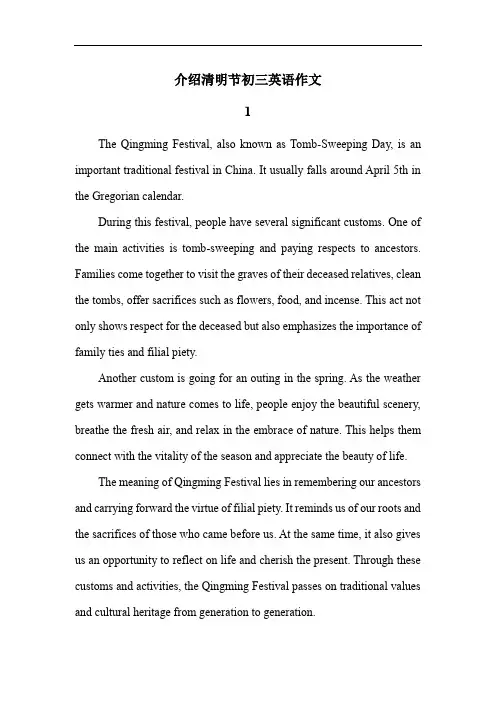
介绍清明节初三英语作文1The Qingming Festival, also known as Tomb-Sweeping Day, is an important traditional festival in China. It usually falls around April 5th in the Gregorian calendar.During this festival, people have several significant customs. One of the main activities is tomb-sweeping and paying respects to ancestors. Families come together to visit the graves of their deceased relatives, clean the tombs, offer sacrifices such as flowers, food, and incense. This act not only shows respect for the deceased but also emphasizes the importance of family ties and filial piety.Another custom is going for an outing in the spring. As the weather gets warmer and nature comes to life, people enjoy the beautiful scenery, breathe the fresh air, and relax in the embrace of nature. This helps them connect with the vitality of the season and appreciate the beauty of life.The meaning of Qingming Festival lies in remembering our ancestors and carrying forward the virtue of filial piety. It reminds us of our roots and the sacrifices of those who came before us. At the same time, it also gives us an opportunity to reflect on life and cherish the present. Through these customs and activities, the Qingming Festival passes on traditional values and cultural heritage from generation to generation.The Qingming Festival, also known as Tomb-Sweeping Day, is a traditional festival in China with profound cultural significance. During this festival, people engage in various activities to pay their respects to the deceased and cherish the memories of their ancestors.In some regions, people have the custom of eating Qingtuan, a kind of green sticky rice dumpling. It is not only a delicious treat but also a symbol of the season. Meanwhile, children often fly kites on this day. The colorful kites soaring in the sky add a lively atmosphere to the festival.The Qingming Festival embodies the deep longing for the departed and the respect for life. It is a time when families come together to visit the graves of their loved ones, clean the tombstones, and offer sacrifices. This act of remembrance shows our gratitude and love for those who have passed away.Moreover, the arrival of Qingming also marks the beginning of spring. People enjoy the beautiful scenery of nature, feeling the rebirth and renewal of all things. It reminds us to cherish the present and make the most of every moment.In conclusion, the Qingming Festival is not only a traditional festival but also a carrier of cultural heritage and emotional connection. It allows us to reflect on life and death, and appreciate the preciousness of life.The Qingming Festival is one of the most significant traditional festivals in China. It has a long history and rich cultural connotations.Legend has it that the festival originated from the story of Jie Zitui. During the Spring and Autumn Period, Jie Zitui remained loyal to his lord even in difficult times. However, when his lord regained power and sought to reward him, Jie Zitui refused and chose to live in seclusion in the mountains. The lord, in an attempt to force him out, set fire to the mountains, but unfortunately, Jie Zitui died in the fire. To commemorate his integrity and loyalty, people designated the day of his death as the Qingming Festival.Over time, the Qingming Festival has evolved. It not only serves as a day to remember the deceased, but also a time for families to gather, pay respects to their ancestors, and sweep tombs. It is a moment to express filial piety and gratitude.This festival holds great importance for both families and society. For families, it strengthens the bonds among relatives as they come together to perform rituals and share memories. For society, it preserves and passes on traditional values and cultural heritage.During Qingming, people also enjoy the spring scenery, fly kites, and plant trees. It is a blend of solemnity and vitality, reflecting the wisdom and emotions of the Chinese people.In conclusion, the Qingming Festival is a precious part of Chinese traditional culture, carrying profound meanings and values that continue to influence and inspire us.4The Qingming Festival, also known as Tomb-Sweeping Day, is an important traditional festival in China. It holds deep cultural significance and unique customs.One of the main customs is tomb sweeping. Families prepare various offerings such as fruits, flowers, and incense. They clean the tombs, offer the sacrifices, and bow in respect. This ritual shows our respect and remembrance for our ancestors.Another custom is spring outing. During this time, people enjoy the beautiful scenery of nature. It's not only a pleasant activity but also beneficial for physical and mental health. It helps us relax and relieve stress after a long period of study or work.The Qingming Festival is not just a day for simple ceremonies. It reminds us of our roots and the importance of family ties. It also allows us to appreciate the beauty of life and nature. Through these customs, we pass on our culture and values from generation to generation.5The Qingming Festival, also known as Tomb-Sweeping Day, holdsprofound cultural significance and modern value in Chinese society.Traditionally, it is a time when families come together to visit the graves of their ancestors, clean the tombs, and offer sacrifices. This act not only shows respect and remembrance for the deceased but also strengthens the bond within the family. In contemporary society, the festival continues to play a crucial role in enhancing family cohesion. It provides an opportunity for family members, especially those living apart, to reunite and share a common purpose.Moreover, the customs of Qingming Festival can be inherited and innovated. For instance, in addition to the traditional practices, we can organize family gatherings to share stories and memories of our ancestors, promoting a deeper understanding of family history and values. We can also use modern technology to document and preserve these precious moments, creating digital archives for future generations.In conclusion, the Qingming Festival is not merely an ancient tradition but a vital link that connects the past, present, and future. It helps us cherish our roots while adapting to the changes of the times, ensuring that its essence endures and flourishes.。
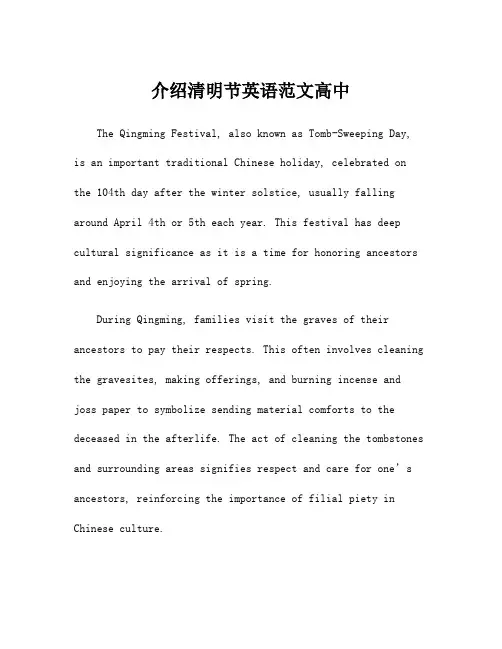
介绍清明节英语范文高中The Qingming Festival, also known as Tomb-Sweeping Day, is an important traditional Chinese holiday, celebrated on the 104th day after the winter solstice, usually falling around April 4th or 5th each year. This festival has deep cultural significance as it is a time for honoring ancestors and enjoying the arrival of spring.During Qingming, families visit the graves of their ancestors to pay their respects. This often involves cleaning the gravesites, making offerings, and burning incense and joss paper to symbolize sending material comforts to the deceased in the afterlife. The act of cleaning the tombstones and surrounding areas signifies respect and care for one’s ancestors, reinforcing the importance of filial piety in Chinese culture.In addition to tomb-sweeping, Qingming is also a time for family gatherings and outings, as it marks the warming of the weather and the blossoming of spring. Many people take advantage of the holiday to enjoy the outdoors, go for picnics, and partake in various springtime activities. Kite flying is particularly popular during this festival. People often fly kites as a way to symbolize letting go of the past and welcoming new beginnings. The kites are often adorned with messages or prayers, and it is a vibrant sight to see colorful kites filling the sky.Traditional foods are also an integral part of the Qingming Festival. People often prepare special dishes, such as sweet green rice balls, known as "qingtuan." These delicacies are made of glutinous rice and filled with sweet fillings, typically made from red bean paste or other sweet ingredients. Eating these seasonal treats helps to celebrate the arrival of spring and serves as a reminder of the connection to the earth and nature's bounty.In recent years, Qingming has also become a time for environmental awareness. Many people incorporate treeplanting into their celebrations, reflecting on theimportance of nature and sustainability. This aspect of the festival emphasizes the balance between honoring the past and caring for the future.Overall, the Qingming Festival is a rich tapestry of cultural traditions that celebrate ancestry, nature, and the renewal of life. It serves as a reminder of the continuous cycle of life and death, while also encouraging people to appreciate the beauty of nature and the importance of family ties. As this festival evolves, it not only preserveshistorical customs but also embraces contemporary values, making it a dynamic and cherished occasion in Chinese society.。
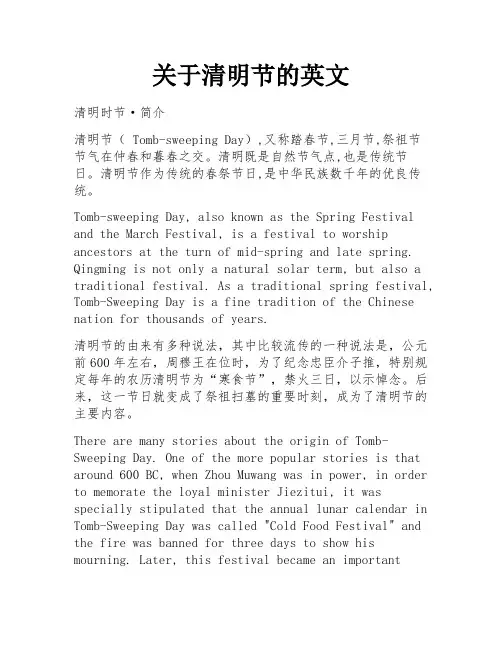
关于清明节的英文清明时节·简介清明节( Tomb-sweeping Day),又称踏春节,三月节,祭祖节节气在仲春和暮春之交。
清明既是自然节气点,也是传统节日。
清明节作为传统的春祭节日,是中华民族数千年的优良传统。
Tomb-sweeping Day, also known as the Spring Festival and the March Festival, is a festival to worship ancestors at the turn of mid-spring and late spring. Qingming is not only a natural solar term, but also a traditional festival. As a traditional spring festival, Tomb-Sweeping Day is a fine tradition of the Chinese nation for thousands of years.清明节的由来有多种说法,其中比较流传的一种说法是,公元前600年左右,周穆王在位时,为了纪念忠臣介子推,特别规定每年的农历清明节为“寒食节”,禁火三日,以示悼念。
后来,这一节日就变成了祭祖扫墓的重要时刻,成为了清明节的主要内容。
There are many stories about the origin of Tomb-Sweeping Day. One of the more popular stories is that around 600 BC, when Zhou Muwang was in power, in order to memorate the loyal minister Jiezitui, it was specially stipulated that the annual lunar calendar in Tomb-Sweeping Day was called "Cold Food Festival" and the fire was banned for three days to show his mourning. Later, this festival became an importantmoment to worship ancestors and sweep graves, and became the main content of Tomb-Sweeping Day.1. 扫墓祭祖清明节是祭祀先人的重要日子,在这一天,人们都会扫墓祭祖。
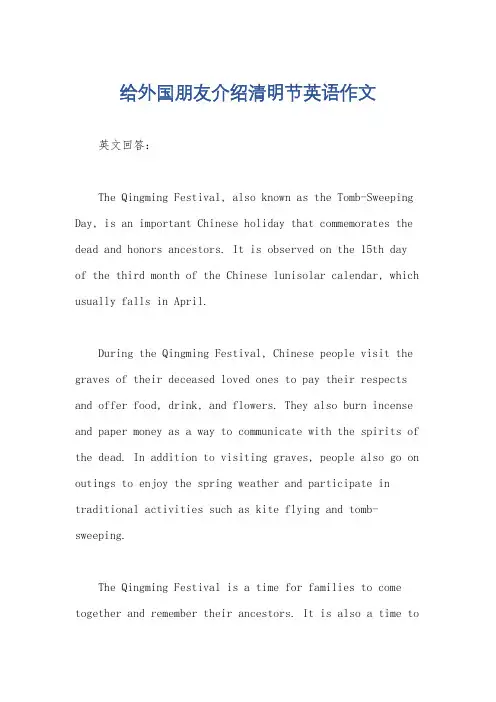
给外国朋友介绍清明节英语作文英文回答:The Qingming Festival, also known as the Tomb-Sweeping Day, is an important Chinese holiday that commemorates the dead and honors ancestors. It is observed on the 15th day of the third month of the Chinese lunisolar calendar, which usually falls in April.During the Qingming Festival, Chinese people visit the graves of their deceased loved ones to pay their respects and offer food, drink, and flowers. They also burn incense and paper money as a way to communicate with the spirits of the dead. In addition to visiting graves, people also go on outings to enjoy the spring weather and participate in traditional activities such as kite flying and tomb-sweeping.The Qingming Festival is a time for families to come together and remember their ancestors. It is also a time toreflect on the cycle of life and death and to appreciate the importance of family and tradition.中文回答:清明节,又称扫墓节,是重要的中国节日,用来纪念死者和尊崇祖先。
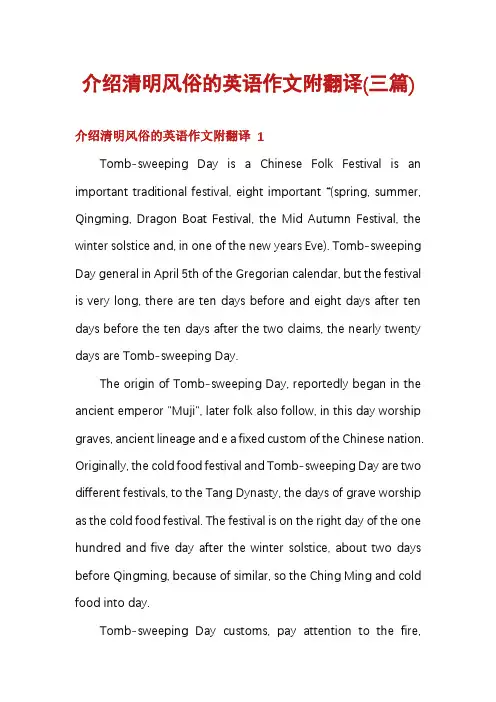
介绍清明风俗的英语作文附翻译(三篇)介绍清明风俗的英语作文附翻译 1Tomb-sweeping Day is a Chinese Folk Festival is an important traditional festival, eight important “(spring, summer, Qingming, Dragon Boat Festival, the Mid Autumn Festival, the winter solstice and, in one of the new years Eve). Tomb-sweeping Day general in April 5th of the Gregorian calendar, but the festival is very long, there are ten days before and eight days after ten days before the ten days after the two claims, the nearly twenty days are Tomb-sweeping Day.The origin of Tomb-sweeping Day, reportedly began in the ancient emperor "Muji", later folk also follow, in this day worship graves, ancient lineage and e a fixed custom of the Chinese nation. Originally, the cold food festival and Tomb-sweeping Day are two different festivals, to the Tang Dynasty, the days of grave worship as the cold food festival. The festival is on the right day of the one hundred and five day after the winter solstice, about two days before Qingming, because of similar, so the Ching Ming and cold food into day.Tomb-sweeping Day customs, pay attention to the fire,grave, as well as spring outing swinging Cuju, playing polo Liu ed.This is the origin and customs of the Ching Ming festival.清明节是我国民间重要的传统节日,是重要的“八节”(上元、清明、立夏、端午、中元、中秋、冬至和除夕)之一。
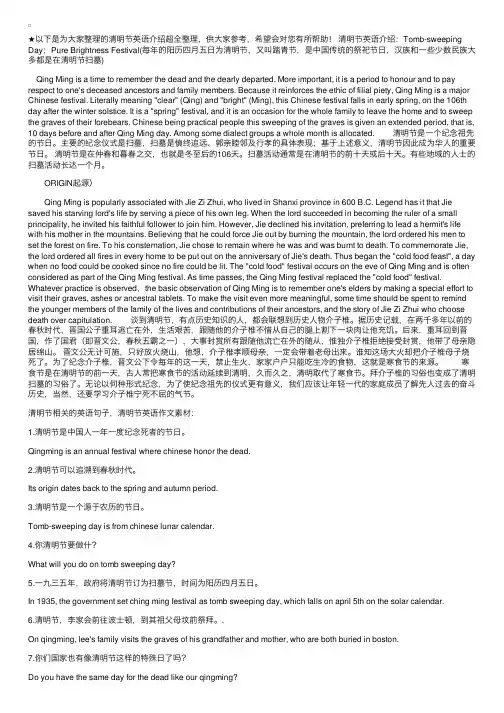
★以下是为⼤家整理的清明节英语介绍超全整理,供⼤家参考,希望会对您有所帮助!清明节英语介绍:Tomb-sweeping Day;Pure Brightness Festival(每年的阳历四⽉五⽇为清明节,⼜叫踏青节,是中国传统的祭祀节⽇,汉族和⼀些少数民族⼤多都是在清明节扫墓) Qing Ming is a time to remember the dead and the dearly departed. More important, it is a period to honour and to pay respect to one's deceased ancestors and family members. Because it reinforces the ethic of filial piety, Qing Ming is a major Chinese festival. Literally meaning "clear" (Qing) and "bright" (Ming), this Chinese festival falls in early spring, on the 106th day after the winter solstice. It is a "spring" festival, and it is an occasion for the whole family to leave the home and to sweep the graves of their forebears. Chinese being practical people this sweeping of the graves is given an extended period, that is, 10 days before and after Qing Ming day. Among some dialect groups a whole month is allocated. 清明节是⼀个纪念祖先的节⽇。
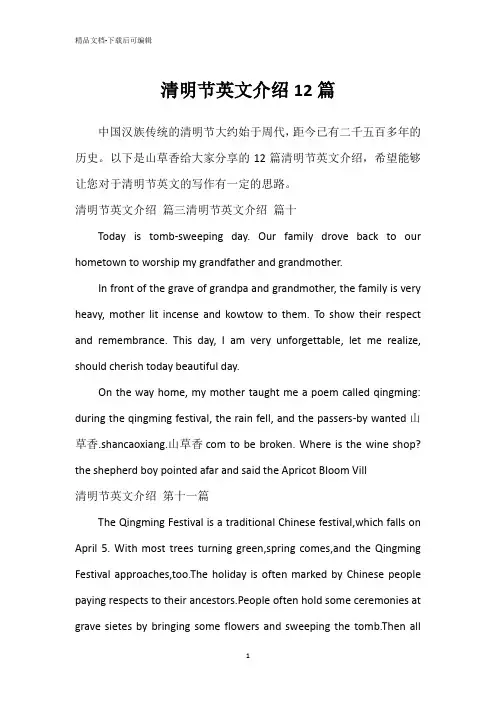
清明节英文介绍12篇中国汉族传统的清明节大约始于周代,距今已有二千五百多年的历史。
以下是山草香给大家分享的12篇清明节英文介绍,希望能够让您对于清明节英文的写作有一定的思路。
清明节英文介绍篇三清明节英文介绍篇十Today is tomb-sweeping day. Our family drove back to our hometown to worship my grandfather and grandmother.In front of the grave of grandpa and grandmother, the family is very heavy, mother lit incense and kowtow to them. To show their respect and remembrance. This day, I am very unforgettable, let me realize, should cherish today beautiful day.On the way home, my mother taught me a poem called qingming: during the qingming festival, the rain fell, and the passers-by wanted山草香.shancaoxiang.山草香com to be broken. Where is the wine shop? the shepherd boy pointed afar and said the Apricot Bloom Vill清明节英文介绍第十一篇The Qingming Festival is a traditional Chinese festival,which falls on April 5. With most trees turning green,spring comes,and the Qingming Festival approaches,too.The holiday is often marked by Chinese people paying respects to their ancestors.People often hold some ceremonies at grave sietes by bringing some flowers and sweeping the tomb.Then allthe familly members sit together to talk about the family history and share traditional meals. The Qingming Festival gives all of us an opportunity to show gratitude to our ancestors.It is because of their achievements that we have a happy life today.清明节英文介绍第十二篇On the day of tomb-sweeping day, grandfather, uncle and uncle, they went to sweep the grave together, but I did not go. I think: they should visit the grave.On their way, there should be a lot of beautiful and beautiful flowers, green grass and, of course, the high and green hillside, beautiful!I thought: what should they bring? Should they go and bow to grandpas mother?I didnt go to the grave, but I was curious to know how the grandfathers mother looked, was there a kind heart, or did not?书中自有黄金屋,书中自有颜如玉。
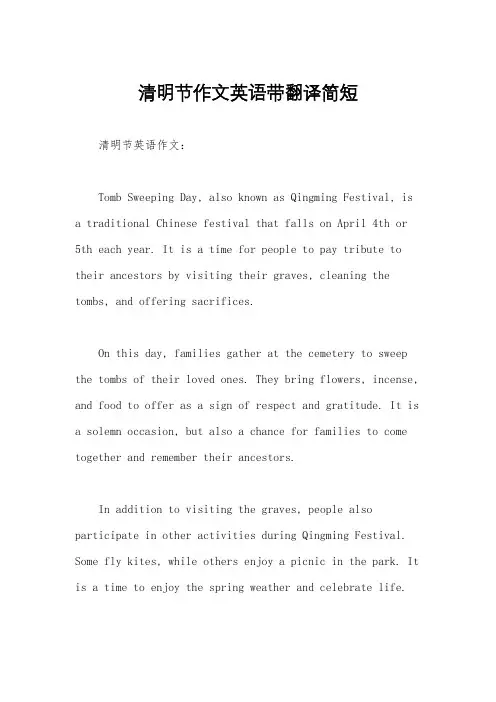
清明节作文英语带翻译简短清明节英语作文:Tomb Sweeping Day, also known as Qingming Festival, is a traditional Chinese festival that falls on April 4th or 5th each year. It is a time for people to pay tribute to their ancestors by visiting their graves, cleaning the tombs, and offering sacrifices.On this day, families gather at the cemetery to sweep the tombs of their loved ones. They bring flowers, incense, and food to offer as a sign of respect and gratitude. It is a solemn occasion, but also a chance for families to come together and remember their ancestors.In addition to visiting the graves, people also participate in other activities during Qingming Festival. Some fly kites, while others enjoy a picnic in the park. It is a time to enjoy the spring weather and celebrate life.However, the true meaning of Qingming Festival is to honor the past and remember those who have passed away. It is a time to reflect on the sacrifices and hardships of our ancestors, and to express our gratitude for the lives they lived.In conclusion, Qingming Festival is a time for families to come together and pay tribute to their ancestors. It is a time to honor the past, reflect on our history, and celebrate the lives of those who have gone before us. Let us cherish this tradition and keep it alive for generations to come.清明节,又称为扫墓节,是中国的传统节日,每年在4月4日或5日举行。
清眀节英文资料"清明节"是中国传统节日之一,通常在每年的农历四月初四或初五之间举行。
它是一个纪念祖先、扫墓祭奠的节日,也被称为"寒食节"。
以下是有关清明节的英文资料:1.英文名称:Qingming Festival/Tomb-Sweeping Day/Pure Brightness FestivalQingming Festival is also known as Tomb-Sweeping Day or PureBrightness Festival.2.节日日期:Qingming Festival falls on April4th or5th of the Chinese lunar calendar each year.The Qingming Festival is observed on April4th or5th of the Chinese lunar calendar annually.3.传统习俗:Traditionally,people visit the graves of their ancestors to sweep tombs,offer sacrifices,and pay respects.Traditional customs include tomb sweeping,offering sacrifices,and paying respects to ancestors.4.食品和活动:Special foods such as Qingming cake and green dumplings are eaten,and outdoor activities like flying kites are popular.Special foods like Qingming cake and green dumplings are enjoyed, while outdoor activities such as kite flying are common.5.文化意义:Qingming Festival not only honors ancestors but also highlights the importance of filial piety,family bonds,and traditional Chinese values.The Qingming Festival is not only a time to honor ancestors but also emphasizes the values of filial piety,family ties,and traditionalChinese culture.以上是关于清明节的英文资料,希望对你有所帮助!。
清明节英文单词一、“清明节”的英文单词:Tomb - Sweeping Day或Qingming Festival二、单词释义- Tomb - Sweeping Day:直译为“扫墓日”,是中国传统节日,人们在这一天会清扫祖先的坟墓以表达对逝者的敬重与怀念。
- Qingming Festival:“清明”的音译加上“节日”(festival),同样指这个传统节日。
三、单词用法- Tomb - Sweeping Day通常作为一个名词短语使用,在句中可作主语、宾语等。
例如:Tomb - Sweeping Day is an important traditional Chinese festival.(清明节是中国一个重要的传统节日。
)- Qingming Festival用法与普通名词短语一致。
如:We celebrate Qingming Festival every year.(我们每年都庆祝清明节。
)四、近义词- Memorial Day(这个词更多用于美国等国家纪念阵亡将士等的日子,与清明节纪念祖先有相似之处,都有纪念的内涵)五、短语搭配- Tomb - Sweeping activities(扫墓活动)- Qingming tomb - sweeping(清明扫墓)- Offer sacrifices on Tomb - Sweeping Day(在清明节祭祀)六、双语例句1. I love Tomb - Sweeping Day because it gives me a chance to pay my respects to my ancestors. It's like a bridge connecting the present and the past.(我喜欢清明节,因为它给了我一个向祖先表达敬意的机会。
就像是一座连接现在与过去的桥梁。
)2. On Qingming Festival, my family and I go to the cemetery. It'sa solemn occasion, just as if we are having a heart - to - heart talk with our departed loved ones.(在清明节,我和我的家人去公墓。
清明节英语科普English: Qingming Festival, also known as Tomb-Sweeping Day, is a traditional Chinese festival that falls on the 15th day after the Spring Equinox. It is a time for people to honor their ancestors by visiting their graves, sweeping tombs, and making offerings of food and paper goods. The festival also has a strong emphasis on nature and is seen as a time to go outdoors and appreciate the beauty of spring. Many people also fly kites and have picnics during this time. In recent years, the festival has also become an opportunity for people to remember loved ones who have passed away, not just ancestors, and to reflect on the importance of family and tradition.中文翻译: 清明节,又称扫墓节,是中国传统节日之一,定在春分后的第15天。
这是人们通过扫墓、祭扫和奉献食物和纸品来怀念祖先的时候。
这个节日也有着对大自然的强烈重视,被视为一个欣赏春天美好的时刻。
许多人还在这个时候放风筝和野餐。
近年来,清明节也成了人们怀念逝去的亲人而不仅仅是祖先、反思家庭和传统重要性的时刻。
清明节的英语介绍《清明节:中国传统节日之一》Qingming Festival, also known as Tomb-Sweeping Day, is a traditional Chinese festival that has been observed for over 2,500 years. It falls on the 15th day after the Spring Equinox, usually around April 4th or 5th. This festival is a time for people to pay respects to their ancestors, as well as to enjoy the springtime and the great outdoors.During Qingming Festival, people visit the graves of their ancestors to clean the tombs, offer food and flowers, and pay their respects. This act of ancestor worship is deeply rooted in traditional Chinese culture and is a way for people to show gratitude and reverence for their forebears. It is also a time for families to come together and reminisce about their loved ones who have passed away.In addition to tomb-sweeping, Qingming Festival is also a time for outdoor activities. People often go for walks in the countryside, fly kites, and enjoy the blooming flowers and fresh air. The festival marks the onset of spring and the warmer weather that comes with it, making it a joyful and lively time of year.Another important aspect of Qingming Festival is the customs of eating traditional Qingming snacks, such as qingtuan (green rice ball) and cold food, which is a way of celebrating spring and the new harvest. These special foods are a delicious way to mark the changing of the seasons and provide a sense of joy and indulgence during the festival.In modern times, Qingming Festival has gained new significance as a time for environmental protection. The Chinese government has encouraged people to opt for eco-friendly burial methods and to use biodegradable offerings for their ancestors, as a way to promote sustainable practices and protect the earth.Qingming Festival is a cherished tradition in China, with its rich cultural and historical significance, as well as its emphasis on family, nature, and respect for the past. It continues to be celebrated with great enthusiasm and serves as a reminder of the importance of honoring our roots and taking care of the world around us.。
清明节介绍英语版Tomb-sweeping Day, also known as Qingming Festival, is a traditional Chinese festival to honor ancestors and pay respects to the deceased. It falls on the 15th day after the Spring Equinox, usually around April 4th or 5th on the Gregorian calendar. The festival has a history of over 2500 years and is celebrated with various customs and activities.One of the main traditions of Tomb-sweeping Day is tomb sweeping, where families visit the graves of their ancestors to clean the tombstones, offer flowers, and burn incense as a sign of respect. It is believed that by doing so, the spirits of the deceased will be at peace and bring good fortune to the living family members. In addition to tomb sweeping, other customs include flying kites, wearing willow branches, and carrying out outdoor activities to embrace the arrival of spring.Another significant aspect of Tomb-sweeping Day is the food. People often prepare special Qingming dishes such as Qingtuan (green rice balls), Stewed Changan (a type of pastry), and Cold Food. These foods have been part of the festival for centuries and hold deep cultural significance.In recent years, the festival has also seen modern developments. With the popularity of social media and online platforms, many people now choose to commemorate their ancestors by posting online tributes and sharing memories of their loved ones. This digital approach has allowed younger generations to participate in the festival in new and meaningful ways.Tomb-sweeping Day is not only a time for solemn remembrance but also a celebration of life and the beauty of nature. It serves as a reminder of the importance of family and heritage, bringing people together to honor their ancestors and strengthen their bonds with one another.In conclusion, Tomb-sweeping Day is a time-honored tradition that plays a crucial role in preserving Chinese cultural heritage. Through its customs and rituals, the festival fosters a sense of connection between past and present, while also promoting a deeper appreciation for life and the natural world. As China continues to embrace modernity, the timeless values of Tomb-sweeping Day remain an integral part of its cultural fabric.。
清明节的来历英文版《Tomb-sweeping Day》Tomb-Sweeping Day, also known as Qingming Festival, is a traditional Chinese festival that is celebrated on the 15th day following the Spring Equinox. This year, it falls on April 4th.The festival has a rich history that dates back over 2,500 years to the Zhou Dynasty. It originated from the time when China was an agricultural society, and it was believed that the spirits of the deceased needed to be cared for.The main custom of Tomb-Sweeping Day is to visit the graves of ancestors and sweep their tombs. Families bring offerings of food, burn incense, and make offerings of paper money and other items to honor their departed loved ones. It is also a time for families to come together and pay their respects to their ancestors.In addition to visiting graves, people also take this opportunity to enjoy the outdoors, fly kites, and participate in other traditional activities such as playing Chinese chess or painting eggs. These activities help to promote a sense of closeness between the living and the dead.The festival also marks the onset of spring and serves as a time for people to celebrate nature and the changing of the seasons. As the weather becomes warmer, people take the opportunity to go out and enjoy the beauty of nature.Tomb-Sweeping Day is a time for reflection, remembrance, andthe coming together of families. It is a day to honor the ancestors and celebrate the beauty of life. Despite the passing of time, this tradition remains an important part of Chinese culture and is a time for families to come together and remember their loved ones.。